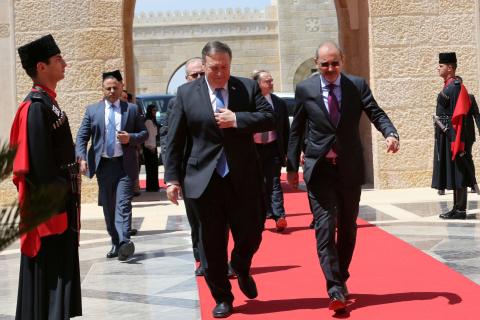Advertisement
Pompeo says US open to 'two-party solution' for Israeli-Palestinian conflict
AMMAN (Reuters) - U.S. Secretary of State Mike Pompeo suggested on Monday he was open to a two-state solution to the Israeli-Palestinian dispute, saying a "two-party solution" was likely in his first extensive comments on peace efforts since taking the job last week.
"With respect to the two-state solution, the parties will ultimately make the decision. We are certainly open to a two-party solution as a likely outcome," he said at a news conference in Jordan after a visit to Israel.
"The Israelis and Palestinians need to have political engagement. We urge the Palestinians to return to that political dialogue," he added.
U.S. President Donald Trump has said he would support a two-state solution, if the two sides agree, although he has stopped sort of re-asserting a U.S. commitment to eventual Palestinian statehood, a longtime bedrock of U.S. policy. The White House is preparing a new Israeli-Palestinian peace plan.
Some 70 years after the creation of Israel, prospects for a Palestinian state appear dim. Israeli-Palestinian peace talks were based on the 1993 Oslo accords that envisaged a two-state solution.
Those talks have been stalled for years and Israel has built more settlements in the occupied territories, which it seized during the 1967 Arab-Israeli war.
Israel has refused any right of return for Palestinians who were expelled or fled and became refugees after the country declared independence in 1948, fearing it would lose its Jewish majority.
Israeli forces have killed dozens of Palestinians in recent weeks who were protesting in the Gaza Strip near the border with Israel to demand the return of refugees and their descendents. Israel says it is protecting its borders.
Palestinians have rejected U.S. peace-making efforts since Trump decided to recognize Jerusalem as Israel's capital and move its embassy to the city, wanted by Palestinians as capital of their own state.
VIOLENCE
Amman was Pompeo's last stop before he returns to Washington DC, where he has not yet entered the State Department. Moments after being sworn in as Secretary of State on Thursday, Pompeo immediately left for a meeting in Brussels, followed by a visit to allies in the Middle East.
"(The Mideast peace) is an incredible priority for the United States to provide whatever assistance we can to allow the two parties to come to a resolution on this incredibly long standing and important conflict," Pompeo said, standing alongside Jordanian Foreign Minister Ayman Safadi.
Pompeo also made his first comments on the violence along the Israel-Gaza Strip border, where Israeli forces have killed 42 Palestinians since protests began on March 30 and injured some 2,000 by gunfire. No serious casualties have been reported on the Israeli side.
"We do believe the Israelis have a right to defend themselves," he said.
The Palestinians say Israel has used excessive force, and its use of live fire has drawn international criticism.
Israel says it is protecting its borders and takes such action only when protesters, some hurling stones and rolling burning tires, or trying to lay explosives, come too close to the border fence.
Turning to Syria, he said the United States was "in perfect accord" with Jordan on Syria, including the preservation of a "de-escalation zone" in the south.
Pompeo said: "We believe there are many countries, including the United States, who will play an important political role in achieving the de-escalation and ultimate political resolution in Syria".
(Reporting by Lesley Wroughton and Suleiman al-Khalidi, Writing by Angus McDowall in Beirut, Editing by Alison Williams, William Maclean)



















Add new comment